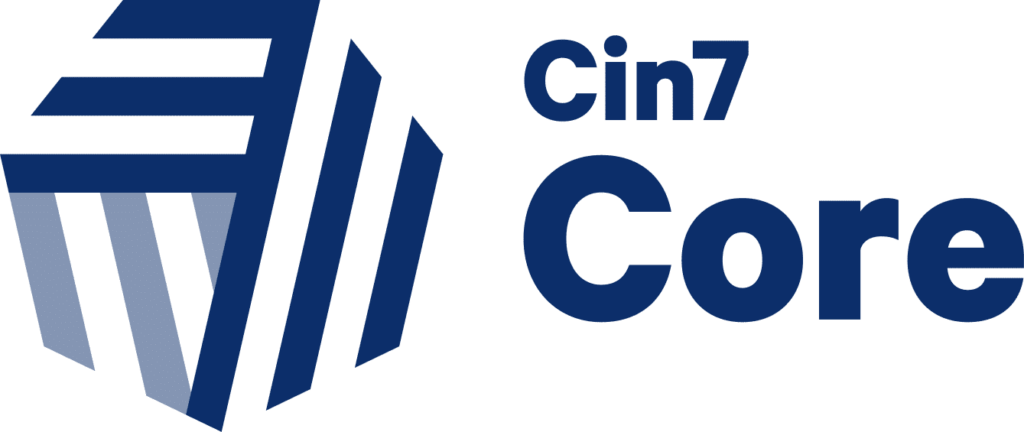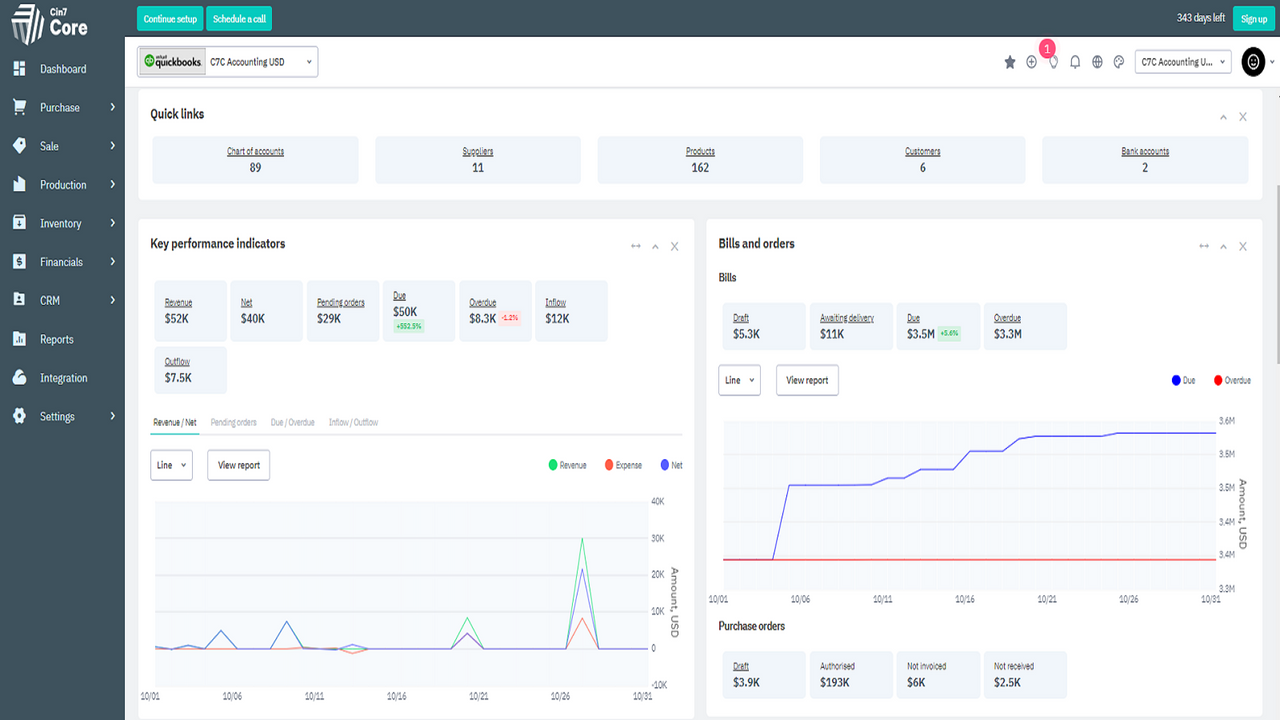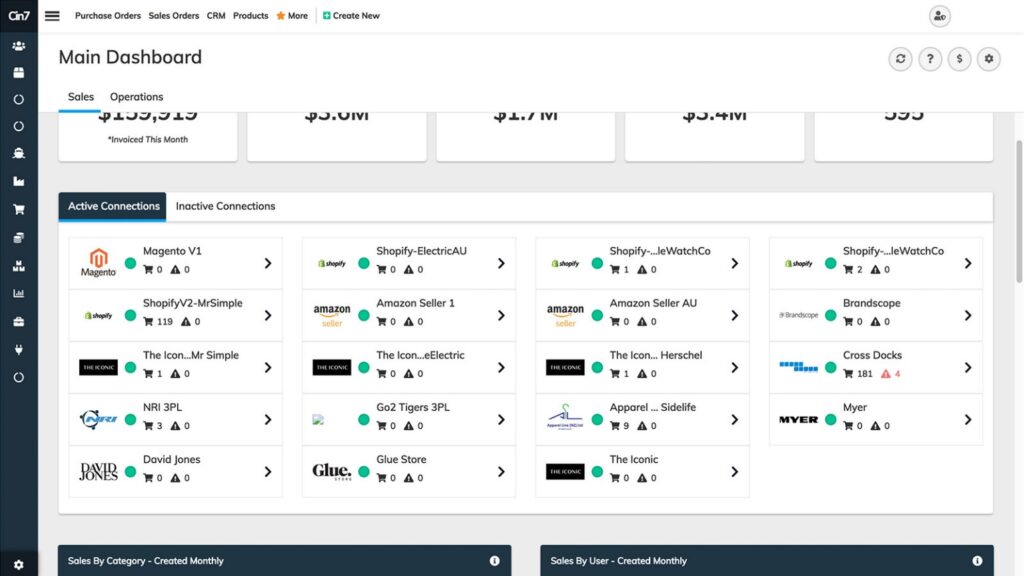Our Verdict

In this intense conflict between Cin7 and Lightspeed, Cin7 emerges as the better choice for your business if it needs comprehensive inventory management across multiple locations where you work with advanced automation and integration features. Also, it is particularly suitable for your growing business, or if you are a retailer or manufacturer with complex inventory needs.
However, Lightspeed supports you as an independent retailer essentially if you seek a straightforward, user-friendly system with a variety of POS capabilities and supplier integrations. Cin7 offers you more customization and scalability, making it fit for all your large operations, while Lightspeed is better for your small to mid-sized business and you want to streamline daily operations efficiently.
Ultimately, Cin7 is the better option for more complex and scalable needs, whereas Lightspeed is perfect for simpler, growth-focused retail management.
Why Choose Cin7

Who Cin7 Is Best For
Cin7 is ideal for you if you:
- Manage a company that requires careful inventory control in multiple locations.
- Require a solution that works flawlessly with other business tools, like accounting software and e-commerce sites.
- Demand adaptable pricing options and customization, especially if you sell through a variety of channels, including online and in-store, or if you have advanced manufacturing requirements.
- Desire to automate and optimize all of your inventory-related procedures, including purchase orders, fulfillment, and returns.
- Seek real-time inventory insights to facilitate more effective decision-making and simple operations.
- Put a high value on extensive support and educational materials to enable your team to get the most out of it.
- Want to make your company more transparent and manageable, reducing the need for manual spreadsheets and simplifying complicated inventory operations
Who Cin7 Is Not Right For
Cin7 is not good for you if you:
- Prefer to manage your inventory manually or using spreadsheets.
- Lack the need for thorough inventory tracking across several channels or locations and real-time visibility.
- Require only basic inventory management and do not require integration of multiple business processes, such as POS, e-commerce, or accounting.
- Run a small company with little inventory and no need for features like cost accounting, barcode scanning, or intricate SKU management.
- Need no customizable solutions, advanced manufacturing capabilities, or integrations with third-party logistics (3PL) providers.
Why Choose Lightspeed

Who Lightspeed Is Best For
Lightspeed is optimal for you if you:
- Own a stand-alone retail store and require a user-friendly system for regular business operations.
- want to expand your company and need management tools to help you do so.
- Run a well-established retail company that requires options for advanced customization and scalability.
- Own several stores and need a single system to make managing inventory and sales easier at each location
- Want to optimize your business processes and require integrated marketing, accounting, and e-commerce tools with flexible pricing options.
Who Lightspeed Is Not Right For
Opt for alternatives to Lightspeed if you:
- Have modest inventory requirements for your small retail business and do not need a lot of features or sophisticated inventory management.
- Run a stable business and you don’t intend to grow or expand to multiple locations, Lightspeed’s extensive features may be unnecessary.
- Need a basic, user-friendly point-of-sale system that offers options that are more affordable and less complicated, without requiring customization or sophisticated tools.
- Seek an alternative to Lightspeed that is more affordable.
Cin7 vs. Lightspeed: Main Differences
| Cin7 | Lightspeed |
Ideal For | ● Businesses looking to grow without having to deal with intricate inventory control. ● Retail businesses that need to track sales across several channels, including both physical stores and online ones. ● Businesses that manufacture products and need to keep track of parts, labor costs, and manufacturing processes, ● Businesses that deal with large amounts of inventory and need effective cost control and tracking. ● Companies that sell online need to integrate with the various platforms. | ● Independent retailers who have basic and everyday inventory needs. ● Retailers looking to expand and streamline operations with advanced management tools. ● Businesses that need extensive customization and scalability to manage retail operations.
|
Pricing | Cin7 Core Plan
Standard: ● $349 per month. ● 5 Users ● Up to 6,000 annual sales order volume ● 2 E-commerce and Application Integrations ● Countless Inventory Locations ● Mobile App ● Add-ons – B2B Portal, POS.
Pro ● $599 per month. ● 10 Users ● Up to 24,000 annual sales order volume ● 4 E-commerce and Application Integrations ● Countless Inventory Locations ● Mobile App ● Add-ons – B2B Portal, POS, API.
Advanced ● $999 per month. ● 15 Users ● Up to 120,000 annual sales order volume ● 6 E-commerce and Application Integrations ● Countless Inventory Locations ● Mobile App ● Add-ons – B2B Portal, POS, API, Flex API.
Cin7 Omni Plan ● Request for pricing ● 8 Users ● 5 E-commerce and Application Integrations ● Mobile App ● Add-ons – B2B Portal, POS, API ● Basic Warehouse Management | Basic Plan: ● $89/month ● Inventory Management ● Retail POS ● Supplier Catalogs ● Lightspeed ecommerce software ● Non-stop Chat Support
Core Plan: ● $149/month ● All Basic Plan Features ● Extensive Inventory Reports ● Ecommerce, Accounting, and Marketing Integrations ● Mobile Scanner Software
Plus Plan ● $289/month ● All Core Plan Features ● Custom Reporting ● Automatic Workflows ● API Access ● All-day Phone Support |
Standout Features | ● Real-Time Data on Inventory ● Warehouse Efficiency ● Precise Data Management ● Multi-Site Administration ● Personalization based on Business Requirements ● Smooth Integration ● Scalable Solutions | ● Central Inventory Management ● Supplier Integration ● Automated Purchasing ● Adjustable Prices ● Extraordinary Reporting ● POS Flexibility ● Help and Assistance |
Cin7 vs. Lightspeed: Standout Features
Cin7

Lightspeed

- Easy Inventory Management: Using Lightspeed’s inventory point of sale system, you can increase your productivity and manage all of your stock with ease.
- Quick and Easy Ordering: Place orders for your new stock in seconds with purchase order functionality, simplifying your replenishment process.
- Multi-Channel Inventory Tracking: Monitor and manage your inventory across various sales channels—whether online, in-store, or on social platforms—through one system.
- Stockout Prevention: Prevent out-of-stock situations with reorder points and receive low-stock alerts, ensuring you always have what you need.
- Accurate Inventory Counts: Reduce your inventory shrinkage with Lightspeed’s easy-to-use counting tools that keep your stock levels precise.
- Seamless Price Updates: Adjust prices across your entire business with a single click, allowing you to have quick and consistent pricing changes.
- Automated Supplier Data with B2B Catalog: Access a vast catalog of products that you link directly to your POS system. Import detailed product information, such as UPC, MSRP, descriptions, images, and names, from thousands of suppliers with ease.
>>> PRO TIPS: Wasp Inventory Management Software: Get It or Not?
Pros and Cons of Cin7

Pros
- Allows you to manage orders, storage, production, sales, fulfillment, and returns all from one platform.
- Improves your inventory tracking and stock control using pick-and-pack operations and integrating barcode scanning for automatic inventory updates.
- Enhances your overall inventory management with features like live stock levels, reordering alerts, and precise cost tracking.
- Allows you to manage multiple locations and bins, improving your inventory’s organization and documentation.
- Lets you build SKUs according to your specific requirements, track lot/batch expirations, and streamline inventory management.
Cons
- Is costly for you to upgrade to a version that meets your customization needs
- Provides you with advanced features only available as paid add-ons.
- Becomes more complex and time-consuming as your business expands.
- Offers more features than necessary, leading to underutilization and higher costs for your small business
Pros and Cons of Lightspeed

Pros
- Helps you make bulk updates to product prices, manage promotions, and track your inventory across multiple locations from anywhere.
- Automates your supplier information with access to a vast B2B catalog, ensuring you access accurate product data with just one click.
- Offers you scalable solutions to meet your needs as a small independent retailer or a growing business.
- Allows you to manage purchasing for all your stores efficiently, and even fulfill special customer orders seamlessly.
- Gives you insights with advanced sales, staff, and inventory reports to help you make better decisions for your business.
- Integrates with your accounting, eCommerce, and marketing tools to streamline your business processes.
Cons
- Is pricey if your business needs advanced features that are only available in its high-tier plans.
- Is a bit too complex for your small retail business, offering you extensive inventory management tools that can be too burdensome.
- Involves additional fees that depend on your specific business requirements and increase your overall expenses.
Cin7 vs. Lightspeed: Customer Reviews
Cin7 Core has an overall rating of 4.2 out of 5 based on 242 reviews on G2. A lot of users highlight its effectiveness in inventory management and integration capabilities with other systems like QuickBooks and Xero. Users appreciate its wide range of features, ease of use once set up, and helpful onboarding support. However, some users note that it can have a complex setup, especially for beginners, and that reporting features and customer support have room for improvement.
Cin7 Omni receives a 3.8 out of 5.0 score owing to 103 reviews on G2. Customers praise it for being functional and easy to use, helpful and customer-responsive. Some other customers complain about a lack of adequate support and challenges with extensive sorting for goods on e-commerce platforms.
Lightspeed Retail gets 4.0 rating based on 289 reviews. Users commend it for access to virtual assistants, adequate support, and its functional ease. Also, some customers find its features a bit complex, like its reporting features and its inadequate customization features.
Cin7 and Lightspeed Competitors
Square POS is a versatile system that supports your business whether it is a small or large business. It enables you to accept debit and credit card payments through various devices, such as iPhones, Androids, iPads, or dedicated POS hardware. Square is easy to set up and flexible in payment acceptance.
Shopify POS helps your retail business to unify its in-store and online sales under one platform. It integrates seamlessly with Shopify’s e-commerce platform, offering you a cohesive experience for managing both online and offline operations. Shopify POS offers you a user-friendly setup and strong support, especially if you already use Shopify for your online store.
QuickBooks POS is an online POS solution that integrates seamlessly with QuickBooks. It offers you features such as inventory management, anytime online access, and automatic payment deposits into QuickBooks Online. If your business uses QuickBooks for accounting, it finds QuickBooks POS particularly beneficial for your operations.
>>> GET SMARTER: Best Accounting Software for Micro Business
Pro Tips
- Match your business size with its complexity. If your business involves extensive inventory management, manufacturing, or wholesale distribution, choose a business with advanced features.
- Consider integration needs, especially of your business relies on seamless integration with various e-commerce platforms, accounting software, or third-party logistics providers.
- Evaluate setup and usability if you prioritize ease of setup and user-friendliness, particularly for your small or medium-sized business for quick deployment and straightforward operations.
- Leverage advanced inventory features for your efficiency, which are comprehensive tools that go beyond basic inventory management.
- Customize your preferred platform based on your plans for business growth. Make sure the platform you choose offers scalable solutions.
- Budget for long-term costs especially for situations whereby advanced features come at a higher price for custom configurations and integrations.
- Utilize automation features to save significant time in inventory management and ordering to simplify your day-to-day operations.
- Focus on customer support using the feedback from existing users. Consider services like onboarding support and 24/7 support.
- Think long-term for your reporting needs, paying attention to the level of detail and customization features.
- Test the system before committing–take advantage of free trials or demos to see which system best fits your team’s workflow and business requirements before making a final decision.
Recap
If your business needs comprehensive, real-time inventory management across multiple locations, with features like warehouse efficiency, multi-location management, and seamless integrations, opt for Cin7.
Lightspeed is for you if you are an independent retailer and you seek to grow your business, with streamlined inventory management, supplier integration, and availability features.
Cin7 is perfect for its automation and accuracy, but can be complex and costly for your small business. Lightspeed is user-friendly with robust support, but can be expensive. Both systems have pros and cons depending on your business needs and scale.













